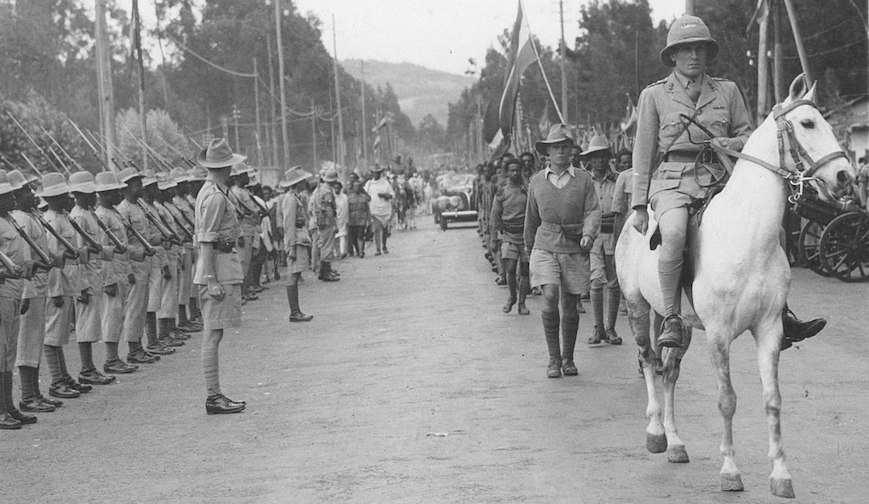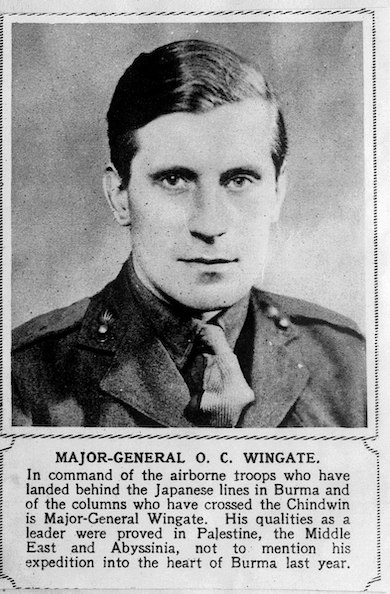Gideon of the 20th Century
There are some people who have made such extraordinary contributions to Israeli society that they are awarded a unique Hebrew name as a term of affection. Israel’s first Prime Minister David Ben Gurion famously became known simply as HaZaken, “the old man.” Baron Edmond de Rothschild, a philanthropist who was driven by the firm belief that wealth is not an end in itself but an opportunity to build the future, gave millions of his own money to help the 19th century struggling Jewish community and was accordingly bestowed the title, HaNadiv HaYadua, “the generous one.”
Like David Ben Gurion and Edmund de Rothschild, Orde Wingate was also given a name which encapsulated his incredible contributions to the Jewish people. In Hebrew, he is affectionally known as HaYadid, or simply, “the friend.”
And what a friend he was.
Through his deeds, faith and courage, Wingate, an indefatigable Christian Zionist became one of the greatest friends the Jewish people has ever had. It’s no surprise that streets are named after him, as is the biggest sporting academy in the country. The contributions of this quirky and out-of-the box British soldier, (who didn’t like obeying the rules) can never be overestimated. Above all, Orde Wingate will be forever remembered for laying the foundation of the first Jewish army in two thousand years.
Born in 1903, Wingate came from a family of staunch Plymouth Brethren, a strict religious group that was birthed in the heart of the British Empire. Like many young men of his upper class, he too served in the British army. Known for being untidy, yet an avid reader, his career was nothing exceptional. He is famous for quipping that he “excelled at average.” Yet despite his so-called non-achievements in the military, Wingate believed that God must still have a plan. But just what that plan was, he didn’t know.
During his army service in Sudan, he sensed that God’s plan for his life was taking shape and that he should therefore be preparing himself for future extraordinary times. Craving adventure and self-discipline, Wingate made a habit of eating raw onions, straining his tea through his socks, and walking around naked while scouring himself with a rubber brush. In 1936, his life changed dramatically when he was posted to the Land of Israel, which was under the rule of the British. Wingate, who had embraced the 1917 British Balfour Declaration which promised the Jewish people a national homeland, was puzzled by his fellow Brits in the land who were now overtly anti-Jewish. Deployed to British intelligence, he shut himself away in a hotel room in Haifa for months, trying to work things out. He studied the origins of the Jewish-Arab conflict, the Hebrew Bible and also Hebrew – which within a few years he would be speaking fluently. He came out of the hotel room an undying Zionist convinced that the times he was living in were of Biblical proportion and God was about to act: and Wingate, was here to be part of that plan.
At the time Arab gangs were murdering defenceless farmers and families on kibbutzim in the Jezreel valley. The British refused to get involved so as not to jeopardise the flow of Arab oil running through their pipeline in the heart of the valley. Wingate was disgusted with the complacency and hateful attitude of the British towards the Jewish community. He believed their policy to be dangerous and a betrayal. Three years before the outbreak of WWII with Europe’s Jews on the brink of destruction, he wrote to his own authorities: “For pity’s sake, let us do something just and honourable before war comes. Let us redeem our promises to Jewry and shame the devil of Nazism, fascism and our own prejudices.” But even that was not enough to persuade the British to take action. It needed more. To win the British over, he advised against them standing idly by while kibbutzim were attacked. He reasoned with them that in doing so, it put the British pipeline in danger. He therefore advocated that he train a Jewish squad of fighters who could defend the pipeline (and of course by default that meant also the kibbutzim). With a double-forked policy favouring the British and the kibbutzim he not only won over the Haganah, the secret Jewish defence force, but he persuaded the British as well that special Jewish forces would be the only thing that could solve the problem of murderous Arab bandits.
“Orde Wingate will be forever remembered for laying the foundation of the first Jewish army in two thousand years”
Formerly, he was charged by the British to protect the pipeline. In setting up the Special Night Squads of Jewish Fighters Wingate believed he had finally discovered why God had put him on earth. He believed it wasn’t about the pipeline, but rather preparing the ground for a future state of Israel. Not only did he train the night squads based on his military experience in Sudan, he used the Israelite battles of the Bible as a blueprint for success: but not just any battle. He turned to the battle between Gideon and the Midianites which took place in the exact same Jezreel Valley, and studied their art of war. Seeing himself as a Gideon, he was commanding a small group of soldiers to defeat the Arab “Midianites,” and what worked for Gideon would work for them. Wingate trained the small groups of lightly equipped men to move silently under the cover of darkness, gather intelligence and attack an enemy where the enemy least expected it – in their own backyard. While many Jewish people had nobly defended the kibbutzim or their farms, there had not been a Jewish military operation like this in over two thousand years. The Special Night Squads succeeded all expectations. Attack was the form of defence. Sabotage ceased, the pipeline was kept safe and the Arab marauders were defeated.
With his courage and faith, Wingate showed the Jewish community that he was a true friend. His belief in Zionism, the Bible and a future Jewish state never waned. During World War II, he was posted to Ethiopia and then Burma, but his heart stayed with the Jews of Europe. Yet despite the terrible and ongoing destruction of the millions, he never lost his faith that Israel would be reborn. Sadly for him – and for us all – he never lived to see the rebirth of Israel. He died in a plane crash just four years before. But he is never forgotten, and for all that he did, he will always be remembered as The Friend.






